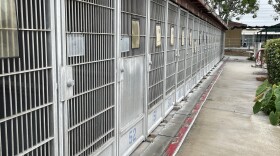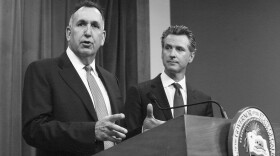Idriss Déby Itno, the president of Chad and one of Africa's longest-serving leaders, was killed in the country's north, where he had traveled to observe the fight against rebel insurgents, state media reported Tuesday.
The announcement came just hours after election officials in Chad certified that Déby, 68, had carried nearly 80% of the vote in April 11 polls, setting him up for a sixth five-year term as president.
In a broadcast on state television from the capital, N'Djamena, army spokesman Gen. Azem Bermandoa Agouna said Deby's son, Mahamat Idriss Déby Itno, – a 37-year-old four-star general — had been named interim president by a transitional council of military officers.
Déby "has just breathed his last defending the sovereign nation on the battlefield" over the weekend, the spokesman said in a statement read on state television, according to Al-Jazeera.
Surrounded by fellow officers, the army spokesman issued "a call to dialogue and peace" to all Chadians "to continue to build Chad together."
He said the transitional council was taking "all measures" to "guarantee peace, security and the republican order."
Déby "took control of operations during the heroic combat led against the terrorists from Libya. He was wounded during the fighting and died once repatriated to N'Djamena," the army spokesman said.
The military, which said the transition council would rule for 18 months, also imposed a nightly curfew of 6 p.m., according to The Associated Press.
It wasn't immediately clear exactly how or when Déby was killed. While the army said he had died over the weekend, Reuters reports that his campaign had said Monday that Déby was joining government troops on the front lines after Libya-based rebels advanced south toward the capital, N'Djamena.
His campaign manager was quoted by Al Jazeera as saying he had postponed his election victory speech to go to the front, where government forces are battling the Front for Change and Concord in Chad after the rebels attacked border posts on election day and then marched farther south.
Déby, a former army commander-in-chief, came to power in Chad in 1990 at the head of a popular revolt against then-President Hissène Habré. Déby later won a series of elections beginning in 1996, all the while weathering numerous rebellions and coup attempts.
His critics accused Déby of repression amid crackdowns on his opponents. The public was also growing increasingly discontent over his management of the country's oil wealth. In 2018, Déby pushed through a new constitution allowing him to remain in power until 2033. Last year, he took the title of "Marshal."
Speaking last year ahead of April's elections, he said: "I know in advance that I will win, as I have done for the last 30 years."
Freedom House rates Chad as "not free" and says that although it has had regular presidential elections since 1996, "no election has ever produced a change in power."
"Legislative elections are routinely delayed, and have not been held since 2011. Opposition activists risk arrest and severe mistreatment while in detention," it says.
Despite his critics at home, Déby, a Muslim, was seen by the West as an ally in the fight against Islamist extremists, such as Boko Haram — which is waging an anti-government insurgency in the Lake Chad Basin. Chad has also aided fights against al-Qaida- and Islamic State-linked groups in the region. The Chadian army helped push Boko Haram out of Nigeria's Borno state.
U.S. State Department spokesperson Ned Price said that the U.S. offers "the people of Chad our sincere condolences."
"We condemn recent violence and loss of life in Chad," he said in a statement. "The United States stands with the people of Chad during this difficult time. We support a peaceful transition of power in accordance with the Chadian constitution."
France, Chad's former colonial ruler, has based its counterterrorism operations in Chad's capital. Paris announced in February that it was sending 1,200 more troops to complement 5,100 French soldiers in the area, AP reports.
"France lost a brave friend," President Emmanuel Macron said in a statement quoted by France24. He said the country "expresses its strong attachment to Chad's stability and territorial integrity."
Copyright 2021 NPR. To see more, visit https://www.npr.org.






